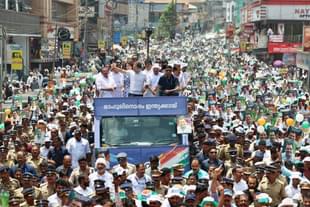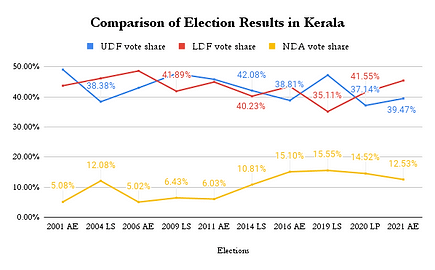Kerala
Lok Sabha 2024: Your Primer For Understanding What's Happening In Kerala
Ananth Krishna S
Apr 07, 2024, 01:23 PM | Updated Apr 08, 2024, 11:38 AM IST
Save & read from anywhere!
Bookmark stories for easy access on any device or the Swarajya app.


The political landscape in Kerala is in flux as we approach the 2024 Lok Sabha General Election. The state has 20 seats in the Lok Sabha and has a total of 2.70 crore voters; 1.31 crore male, 1.39 crore female, and 300-odd third gender voters.
In the earlier general elections in 2019, the state witnessed a sweep by the Congress-led United Democratic Front (UDF) which won 19 out of 20 seats.
The election was characterised by two major consolidations — that of the minority communities against Hindutva, and the majority community due to the Sabarimala issue. The first was motivated by the expectation that Rahul Gandhi (who was also contesting from Wayanad) would become Prime Minister, while the second consolidation was motivated by the anti-CPM position many in the Hindu community held due to Pinrayi Vijayan's conduct after the Sabarimala Judgement.
However, in the 2021 Assembly Elections, the state witnessed a historic sweep with the current Chief Minister Pinrayi Vijayan from the CPI(M) being the first chief minister to be re-elected to power.
Electoral Statistics
An understanding of electoral history will benefit greatly in understanding political dynamics as well. An understanding of vote shares across the state will also benefit in having a more grounded analysis of the possibilities.
Both UDF and LDF has enjoyed an extremely close vote share in the state which has now been disrupted by the BJP, as you can see here:

Brief on Current Situation
The LDF led by the CPI(M) is facing unprecedented anti-incumbency after having won a historic second term in the 2021 Kerala Legislative Assembly Elections.
Meanwhile, the primary opposition, United Democratic Front (UDF) a coalition led by the Congress, is aiming to replicate its 2019 Lok Sabha performance when it won a record 19 out of 20 seats.
The BJP-led NDA meanwhile is aiming to win its first-ever seat in the 2024 Lok Sabha Elections.
While the constituents of UDF and LDF have aligned nationally aligned under the Indian National Developmental Inclusive Alliance (INDIA), they are directly competing in Kerala, even in seats where the BJP is in the reckoning. In some seats, Kerala will witness a three-way race between the three alliances, while in some seats the NDA's vote share is likely to determine the winner.
Kerala's Political Profile
Kerala Politics has long been divided into two fronts — the Left Democratic Front (LDF) and the United Democratic Front (UDF) since the 80s. However, the BJP which has been a marginal player in the state's political scene has now become a viable third front which is securing a significant share of the votes since 2014.
The formation of United Kerala or 'Aikya Keralam' involved merging the Travancore-Cochin Province with the Malabar District, along with the Kasargode Taluk from the South Canara District of the Madras Province.
The first election in 1956-57 marked the ascent of Asia's first democratically elected communist government. Yet, their initiatives in education and land reforms provoked the 'Vimochana Samaram,' or 'liberation struggle,' led by opposing factions and social organisations, ultimately leading to the first dismissal of a State Government.
Since then, the only elected government to complete its term was the C Achutha Menon Government of the Communist Party of India (CPI) - Congress (INC) combine which governed from 1970 to 1977. This 'United Front' government was in fact the first one to be re-elected with K Karunkaran of the Congress becoming chief minister.
However, no front since has ever been re-elected. While E K Nayanar and V S Achuthanadan came close in 1991 and 2011 to a possible re-election for a CPM-led LDF Government, Pinarayi Vijayan became successful in the a historic victory in the 2021 assembly elections.
Major Issues in the 2024 Election in Kerala
The following are the major issues in the run-up to the 2024 General Elections:
- Performance (or lack thereof) of the state government
Much like the 2019 General Election, the unpopularity of the LDF Government led by Chief Minister Pinarayi Vijayan will be a crucial discussion topic. The delayed welfare payments, the arrogant attitude of the CM, along with the serious allegations against his daughter in having received illegal payments.
The Karuvannur Bank scam has also dented the image of the CPM. In general, the performance of the state government is perceived to be high-handed and bungling approach to all issues facing the state.
- INDI Alliance's potential and Likelihood of PM Modi's Return
Unlike before the 2019 General Election, the public perception in Kerala is that the re-election of the current NDA Government led by Prime Minister Narendra Modi is inevitable. This reflects the national mood in a broad sense after the BJP's victory in Chhattisgarh, Madhya Pradesh and Rajasthan in December 2023.
Prime Minister's focus on Kerala as well as the candidate selection of the BJP are all likely to lead to positive outcomes for NDA in the state. The disjointed nature of the INDI Alliance also does not help the Congress-led UDF or the LDF, both of whom are supposed to be part of the same national alliance.
Thus, the NDA's narrative of being the only 'real alternative' gains credence in voter's mind. The popularity of the Prime Minister has gone up significantly in Kerala, with developmental narratives gaining significant traction.
- Support to Islamism and Hindu-Christian Polarisation
An important 'X" factor likely to determine the BJP's success in Kerala will be the amount of Christian votes it manages to attract. There has been a significant disquiet since 2019 regarding the growing influence and power of Islamism in Kerala.
While the Catholic Church has many times in the past highlighted issues such as 'love jihad', the social cohesion in Kerala is fraying at the edges recently due to the creeping dominance of Islamist agenda in Kerala's discourse.
The opposition of the Islamists and Muslim organisations to EWS, the public responses on the conversion of Hagia Sophia to a mosque, a slanted scholarship recommendation that benefitted Muslims over Christians have all been factors in the deterioration of the relationship between Christians and Muslims.
This, combined with BJP's long-standing attempt to court the Christian community and PM's personal outreach to Christians may prove a decisive factor in the upcoming elections.
Even a small swaying in the overall votes of the Chrisitan votes will swing the BJP to winnability in certain seats. The LDF and UDF have been attempting to stem the possible flow of votes to NDA by raising the issue of ethnic clashes in Manipur, however, this is unlikely to affect those predisposed to vote for BJP in Kerala.
- Anti-Hindutva
A major plank of both LDF and UDF is the attempt to project credibility on who can 'deal' with the BJP more effectively or offer an effective alternative to the rise of Hindutva.
This discourse is primarily aimed at securing Muslim votes in the state that had backed the UDF in extraordinary numbers in 2019, expecting Rahul Gandhi to become Prime Minister. However, due to the diminished probability of that in public perception (as stated in point 2), the LDF stands to gain. The unpopularity of the Chief Minister is likely to play spoilsport in capitalising on this.
The push by CPM to depict Congress as being hand-in-hand with the BJP is to the same end. The CPM and Chief Minister Pinarayi Vijayan have also attempted to score political points by highlighting their decision to oppose CAA. The success of this plank is likely to influence the results of all the 6-7 seats in the Malabar region.
The author would like to thank Stuti Biyani for her input.





